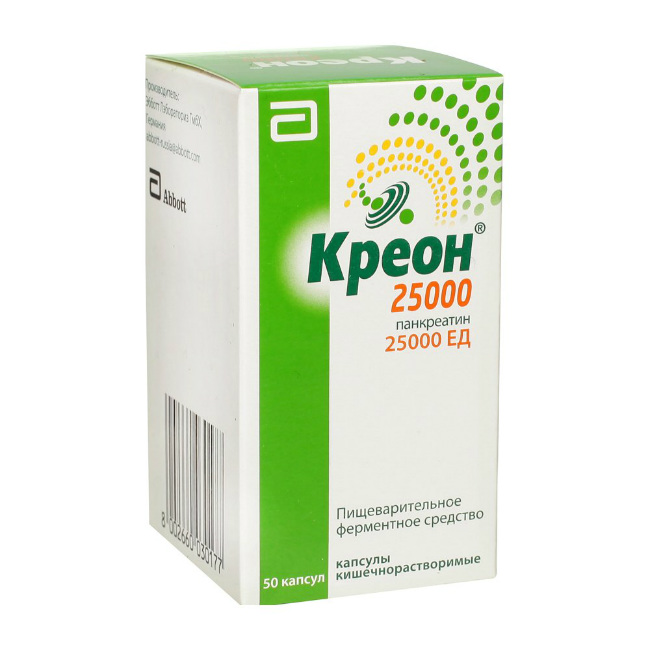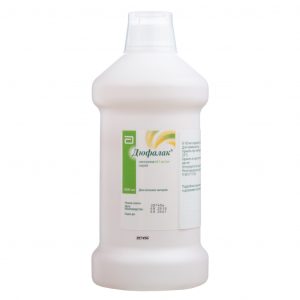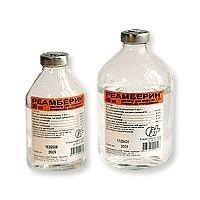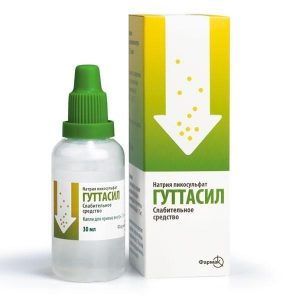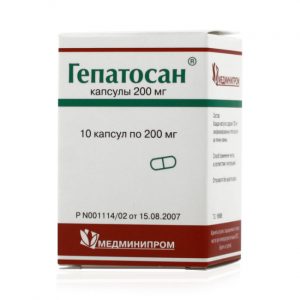Description
Pharmacological action
Pharmacodynamics
Enzyme preparation that improves the digestion of food in adults and children, and thereby significantly reduces the symptoms of pancreatic enzyme insufficiency, including abdominal pain, flatulence, changes in the frequency and consistency of stool.
Pancreatic enzymes, which are part of the drug, facilitate the breakdown of proteins, fats, carbohydrates, which leads to their complete absorption in the small intestine. Creon ® 25000 contains pork pancreatin in the form of minimicrospheres, enteric coated (acid resistant), in gelatin capsules. Capsules dissolve quickly in the stomach, releasing hundreds of minimicrospheres.
This principle is designed to simultaneously pass (enter) minimicrospheres with food from the stomach into the intestines and thoroughly mix the minimicrospheres with intestinal contents, and, ultimately, better distribution of enzymes after they are released inside the intestinal contents.
When the minimicrospheres reach the small intestine, the enteric membrane collapses rapidly (at pH> 5.5), enzymes with lipolytic, amylolytic and proteolytic activity are released, which leads to the breakdown of fats, carbohydrates and proteins. Substances obtained as a result of cleavage are then either absorbed directly or are further cleaved by intestinal enzymes.
Pharmacokinetics of
In animal studies, lack of absorption of undigested enzymes has been demonstrated. as a result, classical pharmacokinetic studies have not been conducted. Drugs containing pancreatic enzymes do not require absorption to manifest their effects. On the contrary, the therapeutic activity of these drugs is fully realized in the lumen of the gastrointestinal tract.
According to their chemical structure, they are proteins and, in connection with this, when passing through the gastrointestinal tract, enzyme preparations are broken down until absorption occurs in the form of peptides and amino acids.
Contraindications
Hypersensitivity to any component of the drug.
Use during pregnancy and lactation
Pregnancy
There are no clinical data on the treatment of pregnant women with drugs containing pancreatic enzymes. In animal studies, absorption of porcine pancreatic enzymes was not detected, therefore, toxic effects on reproductive function and fetal development are not expected. Pregnant women should be prescribed with caution if the intended benefit to the mother outweighs the potential risk to the fetus.
Breastfeeding period
Based on animal studies, during which no systematic negative effect of pancreatic enzymes was detected, no adverse effects of the drug on the infant through breast milk are expected.
You can take pancreatic enzymes while breastfeeding. If necessary, during pregnancy or breastfeeding, the drug should be taken in doses sufficient to maintain an adequate nutritional status.
Special instructions
In patients with cystic fibrosis who received high doses of pancreatin, strictures of the ileum, cecum, and colon (fibrosing colonopathy) are described. As a precaution, if unusual symptoms or abdominal changes occur, a medical examination is necessary to rule out fibrosing colonopathy, especially in patients who take the drug at a dose of more than 10,000 lipase units / kg per day.
Effect on the ability to drive a car and other mechanisms
The use of the drug Creon ® 25000 does not affect or has a slight effect on the ability to drive a car and mechanisms.
Composition
1 capsule contains:
Active ingredient: pancreatin – 300 mg, which corresponds to:
25000 IU Heb. F. lipase,
18000 ED Heb. F. amylase,
1000 units Heb. F. proteases.
Excipients: macrogol 4000 – 75.00 mg, hypromellose phthalate – 112.68 mg, dimethicone 1000 – 2.69 mg, cetyl alcohol – 2.37 mg, triethyl citrate – 6.26 mg.
Hard gelatin capsule: gelatin – 95.08 mg, dye iron oxide red (E 172) – 0.46 mg, yellow iron dye oxide (E 172) – 0.08 mg, titanium dioxide (E 171) – 0.19 mg, sodium lauryl sulfate – 0.19 mg.
Dosage and administration of
Inside
Doses of the drug are selected individually depending on the severity of the disease and the composition of the diet.
Capsules should be taken during or immediately after each meal (including a light meal), swallow whole, do not break or chew, drinking plenty of fluids.
If swallowing is difficult (for example, in young children or elderly patients), the capsules are carefully opened, and the minimicrospheres are added to soft food that does not require chewing and has an acidic taste (pH <5.5), or is taken with a liquid that also has an acidic taste (pH <5.5). For example, minimicrospheres can be added to applesauce, yogurt, or fruit juice (apple, orange, or pineapple) with a pH of less than 5.5. It is not recommended to add capsule contents to hot foods. Any mixture of minimicrospheres with food or liquid should not be stored and should be taken immediately after preparation.highly soluble shell. This can lead to early release of enzymes in the oral cavity, decreased effectiveness and irritation of the mucous membranes. Make sure that there are no minimicrospheres left in the mouth. It is important to ensure sufficient continuous fluid intake by the patient, especially with increased fluid loss. Inadequate fluid intake can lead to or increase constipation. Dose for adults and children with cystic fibrosis The dose depends on body weight and should be 1000 lipase units / kg at the beginning of treatment for each meal for children under four years of age and 500 lipase units / kg during meals for children over four years of age and adults. The dose should be determined depending on the severity of the symptoms of the disease, results of monitoring steatorrhea and maintaining an adequate nutritional status. In most patients, the dose should remain less than or not exceed 10,000 lipase units / kg body weight per day or 4,000 lipase units / g consumed fat. Dose for other conditions accompanied by exocrine pancreatic insufficiency The dose should be set taking into account the individual characteristics of the patient, which include the degree of digestive insufficiency and fat content in food. The dose required by the patient along with the main meal varies from 25,000 to 80,000 units of lipase, and when taking a light meal, half the individual dose. In children, the drug should be used as directed by a doctor. Side effects Disorders of the gastrointestinal tract Very often (? 1/10): pain in the abdomen. Often (? 1/100, <1/10): nausea, vomiting, constipation, bloating, diarrhea. Frequency unknown: strictures of the ileum, cecum, and colon (fibrosing colonopathy). Gastrointestinal disorders are mainly associated with the underlying disease. The incidence of adverse reactions such as abdominal pain and diarrhea was lower or similar to that with placebo. Iliac, cecum, and colon strictures (fibrosing colonopathy) were observed in patients with cystic fibrosis who received high doses of pancreatin preparations (see section Special Instructions). Disorders of the skin and subcutaneous tissue Infrequently (? 1/1000, <1/100): rash. Frequency unknown: pruritus, urticaria. Immune system disorders Frequency unknown: hypersensitivity (anaphylactic reactions). Allergic reactions were observed mainly from the skin, but there were also other manifestations of allergies. Messages about these side effects were received during the period of post-marketing use and were spontaneous. There is insufficient data to accurately assess the incidence of cases. When used in children, no specific adverse reactions were noted. The frequency, type and severity of adverse reactions in children with cystic fibrosis were similar to those in adults. Drug Interactions No studies on interaction. Overdose Symptoms: hyperuricosuria and hyperuricemia. Treatment: drug withdrawal, symptomatic therapy. Storage conditions Store at a temperature not exceeding 25 ° C in tightly closed packaging. Keep out of the reach of children! The Expiration of is 3 years. Expiration after first opening of the vial – 3 months. Do not use after the expiry date stated on the packaging. Deystvuyuschee substances Pancreatin Form of Treatment kapsul
